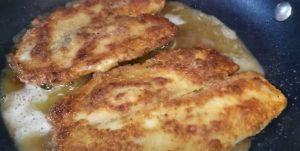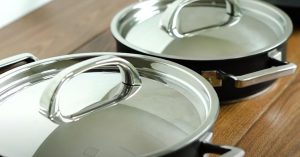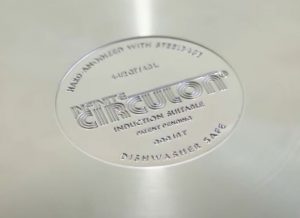Anodized cookware is a great way to cook with high-quality nonstick surfaces. The hard anodized coating is made of aluminum oxide and produces a nonstick surface that’s easy to clean and resistant to stains, burns, and scratches. Anodized cookware is a type of cookware that has been treated with a non-stick coating. The basic idea behind this type of cookware is to prevent food from sticking to the pan, which can make cooking much easier and more efficient. But is hard anodized cookware safe?
It’s important to know the answers before making any purchases or committing to certain pieces. After all, if you don’t like how your new piece of cookware performs in the kitchen, then what good is it?
What Is Hard Anodized Cookware?
 Hard anodized cookware is a type of cookware that has been treated with a layer of aluminum oxide, which helps to prevent corrosion. The layer is applied to the metal using a special process. The result is a material that can be used for long periods without having to worry about it corroding or being damaged by acidic foods.
Hard anodized cookware is a type of cookware that has been treated with a layer of aluminum oxide, which helps to prevent corrosion. The layer is applied to the metal using a special process. The result is a material that can be used for long periods without having to worry about it corroding or being damaged by acidic foods.
The reason you would want to use hard anodized cookware instead of non-hard anodized cookware is that the latter will eventually start to degrade over time, especially when exposed to acidic foods like tomato sauce or lemon juice. Hard anodized cookware does not deteriorate as quickly, so you will have it for longer before needing to replace it.
How Does Hard Anodized Cookware Work?
Anodized Cookware is made of hard-anodized aluminum, making it resistant to rust, corrosion, and organics. State-of-the-art hard anodization creates a tougher layer of protection than older technology did, enabling food to cook evenly in the pan and reducing the transfer of flavors between food and cooking surface. Additionally, hard anodized cookware is safe for the environment; unlike stainless steel or porcelain-coated cookware which can contain lead, aluminum combines with iron in the pan alloy to form iron carbide. This material cannot cause harm if ingested by a cook or child as there are no known harmful effects from consuming it.
Is Hard Anodized Aluminum Cookware Safe?
Anodized aluminum cookware is a type of cookware that is anodized, which means it has been treated with a coating that hardens the aluminum. Anodizing hardens the metal, but it does not change its chemical composition. This means that if you use an anodized aluminum pan constantly and follow all directions, your food will be safe to eat.
However, anodized aluminum can corrode when it comes in contact with acids or alkaline substances such as vinegar—the chemicals in these may be strong enough to weaken the coating and cause it to wear off over time. If this happens, you could end up eating toxic metals such as cadmium or lead at some point.
Which is safer: hard anodized or nonstick?
Hard anodized aluminum cookware is considered to be safer than nonstick cookware because it does not have the potential for chemical reactions that can damage your health. However, this does not mean that hard-anodized aluminum cookware cannot be dangerous if used improperly.
The reason why nonstick cookware is considered safer than hard-anodized aluminum is because of its coating. Nonstick coatings contain toxic chemicals that can leech into food if they are scratched or damaged during cooking. This can cause health problems such as cancer and Alzheimer’s disease. The more you use these types of cookware, the greater your risk of exposure becomes.
Hard anodization is less likely to leech toxic chemicals into your food because it does not contain any metallic compounds. However, this type of cooking surface still has some risks associated with it. Hard anodized surfaces are more likely to scratch easily and have lower durability than nonstick surfaces, which means they will eventually wear out after extended use (if they’re made from cheap materials).
What is the safest cookware for your health?
Hard anodized aluminum cookware is one of the safest options. Hard anodized cookware has its outer layer coated with a layer of aluminum oxide, which makes it more durable than other types of cookware.
With this type of metal, the outer layer is harder and more scratch-resistant than other types of metal (like copper). This allows you to use knives without worrying about cutting yourself.
This type of metal also has a non-reactive surface that does not react with food or cooking oils. This means that you can safely make foods like eggs, meat, and fish without worrying about burning your food or cooking oil.
Which brand of hard anodized cookware is best?
Hard anodized cookware is a type of cookware that has been hardened by the application of an oxide layer. This layer makes the pan very hard and durable, but it also increases the risk of your pans heating up too much.
There are several brands of hard anodized cookware on the market today, but which one is best?
The best brands will have thick bases, high-quality aluminum, and a coating that doesn’t contain PFOA (a chemical used in some plastics). PFOA can be toxic if you eat or drink it—so if you’re concerned about this, look for anodized cookware with no PFOA!
Things to be aware of before buying Hard Anodized Cookware
 Hard anodized cookware is a great option for those who want to avoid harmful chemicals and toxins. However, there are some things you should be aware of before buying hard anodized cookware:
Hard anodized cookware is a great option for those who want to avoid harmful chemicals and toxins. However, there are some things you should be aware of before buying hard anodized cookware:
First of all, the surface of most hard anodized cookware is nonstick. This means that when you cook food in it, you can use less oil or butter, which saves money and reduces calories.
Another great thing about hard anodized cookware is that they’re usually made with stainless steel or aluminum. Both of which are more durable than other materials used in other types of pans and pots. This means that your pan won’t rust as quickly or wear down as fast as other types of pans and pots could over time. The only downside to this is that some people prefer cast iron because they think it looks nicer (and they’re right!).
Pros and Cons of Hard-Anodized Cookware
Hard-anodized cookware is a great option for many people but like all things, there are some drawbacks.
Let’s take a look at some of the pros and cons of hard-anodized cookware.
Pros
1) Durable
-Hard-anodized cookware is durable because it is made of tempered aluminum alloy. It’s a high-quality material that can withstand high temperatures and repeated use. This makes it extremely functional for use on the stovetop, in the oven, and the microwave.
2) Heat-Conductive
-Hard-anodized cookware conducts heat extremely well. You can easily transfer that heat from one utensil to another without having to worry about burning yourself. This makes it great for cooking with pans made out of metal or glass that are not as conductive as plastic or ceramic ones.
3) Scratch-Resistant
-Hard-anodized cookware is scratch resistant because it has been coated with an aluminum oxide layer that prevents these scratches from forming while still allowing them to be removed with soap and water using a soft cloth or sponge (or even your fingers).
4) Enables Healthier Cooking
-Hard-anodized cookware is an important tool for health-conscious people because it allows you to cook food at a lower temperature. This means that you can control how much fat and salt your meals contain, which can help reduce the risk of heart disease and other chronic illnesses.
5) Low Maintenance
-Hard-anodized cookware is also easy to care for because it does not require any special cleaning or maintenance. You simply need to rinse off the pan after use. Then wipe it down with a paper towel or hot water.
Cons
1) Expensive
– Hard-anodized cookware is expensive. If you’re looking to get the best of the best, you’ll likely want to pay top dollar for your new set of pots and pans.
2) Short Lifespan
-Hard-anodized cookware has a short lifespan. The main reason is that it’s made of aluminum, which is an extremely durable material, but it also means that it will become scratched or dented over time as you use it. Don’t expect to be able to use this cookware for decades on end!
3) Not Dishwasher-Safe
– Hard-anodized cookware isn’t dishwasher safe! Do not put these pans in the dishwasher because they’ll get scratched and damaged by the water jets. Instead, we recommend hand washing and drying them immediately after each use so that they last as long as possible!
4) Most are Incompatible with Induction
 -Hard-anodized cookware is made to be anodized, which means it’s not meant to be used with induction cooktops. This can pose a problem when you’re cooking on an induction stovetop. Induction heat can damage the anodized surface, causing it to wear off and become less effective. Some brands do have some available that are safe for induction cooktops. Check the label!
-Hard-anodized cookware is made to be anodized, which means it’s not meant to be used with induction cooktops. This can pose a problem when you’re cooking on an induction stovetop. Induction heat can damage the anodized surface, causing it to wear off and become less effective. Some brands do have some available that are safe for induction cooktops. Check the label!
5) Not Made for Extremely High Heat
-Do not use hard-anodized cookware with extremely high temperatures. You shouldn’t use it in any situation where you need to fry something at high temperatures like a panini press or a waffle iron. It may even warp if you put it in the oven or microwave for too long.
Conclusion
Hard anodized cookware is a great choice for those who want to protect their health and the environment.
The material used in hard anodized cookware is non-toxic, environmentally friendly, and safe for you and your family.
However, you should always be careful when using hard anodized cookware because of the high temperatures at which it can be used.
We hope our article has helped you understand more about hard anodized cookware. We wish you luck in making the right choice for yourself!
